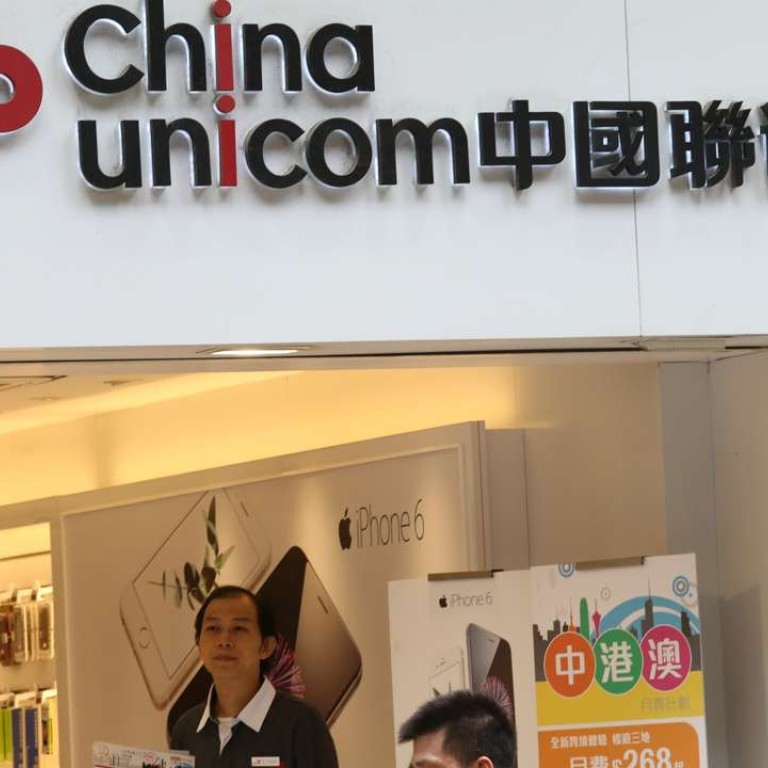
China Unicom tipped to become more market-driven under ‘mixed-ownership’ scheme
With the central government’s mixed-ownership plan now in motion, China Unicom may be able to step up its transformation into a market-driven company like most telecommunications network operators outside of the country, according to analysts.
“While the details are yet to be ironed out, what we will be looking for is whether China Unicom can achieve its objective to operate more like a private company,” Jefferies equity analyst Edison Lee said on Thursday.
Bernstein Research senior analyst Chris Lane pointed out that “the concept of mixed ownership is to enable the company to be more market-driven”.
That means Unicom’s strategy would be about planning and deploying business resources based on market conditions and its customers’ changing needs.
The operator’s recent losses had been a direct result of its previous focus on 3G expansion at a time when consumers on the mainland wanted faster 4G mobile broadband services.
“Unicom’s huge cut in capital expenditure guidance this year is an indication the company is already moving in the right direction,” Lane said.
Wang Xiaochu, the chairman and chief executive at Unicom, announced last month that the company’s capital spending this year would come in at 45 billion yuan (US$6.5 billion), down from 72.1 billion yuan last year, as it prepares resources for future 5G network expansion.
“We will not make the same mistake in the 5G era,” Wang said at that time. “In terms of the money, we have to start preparing now.”
Shares of Unicom, however, took a tumble when they resumed trading on Thursday, as investors had their first chance to react to the news that the operator’s parent aims to implement Beijing’s mixed-ownership scheme for SOEs.
After an initial sprint higher at the start of trading on Thursday, Unicom’s Hong Kong shares staged a U-turn and retreated 3.87 per cent to close at HK$10.44.
“The stock fell back to where it was before the jump on Monday,” Bernstein’s Lane said. “It rose on speculation and then fell again when investors heard the deal will be done at the A-share level.
“I expect the stock to stabilise at that level and move more in line with the overall market until we get more news on the deal.”
The market reaction to Unicom somehow dragged down the shares of its mainland telecommunications industry peers on Thursday. China Mobile’s shares slid 1.04 per cent to HK$85.85, while China Telecom declined 1.53 per cent to HK$3.85.
Trading in Unicom parent China United Network’s shares in Shanghai remained suspended.

In December, the central government said mixed-ownership was a key point for SOE reform, and substantial progress needed to be made in seven industries, including telecommunications.
Unicom had already foreshadowed that move in October last year, when it said that its parent was among the first batch of SOEs selected by the National Development and Reform Commission to implement the central government’s mixed-ownership reform plan.
That fuelled speculation about the potential for China’s internet triumvirate known as BAT – Baidu, Alibaba Group Holding and Tencent Holdings – to invest in Unicom. Alibaba is the owner of the South China Morning Post.
“While the market will like the brand appeal of BAT, the big impact is not from the investor but from the ability and willingness of Unicom’s management to become more market-oriented,” Lane said. “I believe this is already underway under chairman Wang.”
Jefferies’ Lee, however, said Unicom’s mixed-ownership experiment “may not be positively perceived by the market without the participation of one or more of the BAT companies”.
Lee expected the completion of the private-sector investment in Unicom’s parent will take a few more months.
“It is possible that the Unicom parent’s A share will remain suspended throughout this period, forcing any bullish A share investor to buy Unicom’s H share through the Shanghai-Hong Kong Connect scheme, especially since its H share is trading at a 51 per cent discount to the A share,” he said.
The Shanghai-Hong Kong Connect is a cross-border investment channel that links Shanghai’s stock exchange with the Hong Kong bourse.
Unicom last month posted widely expected downbeat earnings for 2016. It reported a 94 per cent drop in net profit to 625 million yuan, down from 10.6 billion yuan in 2015, due to higher network, marketing support and other operating expenses. Revenue slipped slightly to 274.2 billion yuan, from 277 billion yuan a year earlier.


